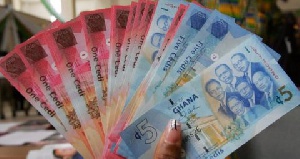By: Seth Adom Asomaning
The economy of Ghana is still developing and the need for export earnings to support national expenditure which is substantially denominated in convertible currency is so overwhelming.
The unbridled depreciation of the cedi is an economic phenomenon which is explained by the simple principle of demand and supply. Foreign currency (dollar, pound sterling, Euro, French Franc and other currencies) are all sold at a price and in Ghana it is the cedi which is used to buy those currencies.
Whenever there is an increase in the supply of those currencies, their prices fall, all things being equal. The same principle works for other commodities such as maize, tomatoes, plantain, cocoa, gold, crude oil, beads, etc.
What should be of concern to us as a nation is how to increase the supply of foreign currency to make it cheaper to buy. Foreign currency is received when a country exports goods and services. It is also received through donor sources such as grants or loans by borrowing. I dare say that the most sustainable source of foreign currency supply is by increased export earnings.
Donor supplies could dry up with or without notice, especially where the conditionalities attached are not sufficiently met because of their excruciating nature which may hurt the citizens. There is also a limit to the quantum of loans that the country can take. The major constraint on loans is the burden of repayment, however prolonged the period may be.
Since the early 1980s when the country embarked on the Economic Recovery Programme, one of the clarion calls has been the need to expand the export base to earn more foreign exchange to meet the ever increasing import bill.
The economy of Ghana is still developing and the need for export earnings to support national expenditure which is substantially denominated in convertible currency is so overwhelming. Conscious effort should, therefore, be made to gather all export proceeds for national development.
Export proceeds
How do we gather or collect export proceeds? With the advent of money as a medium of exchange, which replaced the barter system of yesteryear, and the evolution of international banking, all modern economies use the banking system to facilitate the collection of export proceeds. It is a major concern that some exporters in the non-traditional sector have chosen not to repatriate their export proceeds. This is wrong because it deprives the economy of the use of that national asset.
There should be an obligation on all exporters to repatriate all their export earnings through local banks. Such proceeds will be held on the foreign exchange accounts of the respective exporters banks in Ghana and will be available to them on demand for the importation of their essential inputs, machinery, spare parts, raw materials, pay for their foreign travels, children’s educational expenses, medical expenses abroad, trade missions/fairs abroad and all other lawful expenditure.
An incalculable harm is done to the economy if exporters are permitted to keep their earnings outside the banking system. Capital flight is facilitated if people have access to foreign currency from outside the banks and other authorised dealers.
In this connection, we wish to observe that patriotic appeals and moral suasion will not persuade exporters to repatriate their foreign exchange earnings. There must be an obligation for such earnings to be transferred through the banks for the general good of the economy. Ghanaians have a penchant for hoarding foreign currency for speculative reasons and as a store of value.
This attitude makes sense because of the perennial shortage of the convertible currency, but one of the remedies for this ailment lies in making the hard currency available through the transfer of export proceeds through the banking system.
Over liberalisation of the economy
It is worthy to note that in recent times many Ghanaians of diverse persuasions are unanimous in their concern about the unprecedented rate at which the cedi has depreciated. Many suggestions and recommendations have been proffered. It is against this background that we wish to add that there is the urgent need to review the economic liberalisation package, with special reference to our imports.
The rich and most advanced economies of the world, in spite of globalisation all regulate their economies. That explains the trade wars constantly raging between some of the developed countries. To conserve the scarce foreign exchange for essential goods, we should regulate the importation of such items such as Nkatie burger, tooth pick, some soaps, some items of clothing, rice, catapults and host of other non-essential items.
A conscious effort should be geared towards conservation of foreign exchange which should be mainly through curbing the demand for it. That is why one finds it difficult to agree with some members of the Ghana Union Traders Association (GUTA) who though bemoan the uncontrolled depreciation of the cedi at the same time oppose the imposition of taxes on some non-essential goods imported into the country to make them more expensive and, therefore, curb the demand for them.
The global trading environment
For years, Ghana has relied mainly on the traditional exports of raw cocoa, timber, diamond, electricity and other minerals such as manganese, bauxite and recently crude oil for its export earnings. We need to process and add value to them.
The beauty in value addition, apart from the increased earnings, also lies in job creation. The level of unemployment and underemployment, especially among the youth and other vulnerable groups, calls for urgent measure for the creation of job opportunities and to prevent job losses in the short and medium term.
Dollarisation of the economy
The discussion must be taken further and concluded by explaining why it is not in the economic interest of the country for people to receive payments for goods bought and services rendered in the country in any currency apart from the cedi which is the legal tender.
The first reason is that if local residents, including exporters and other recipients of foreign currency (e.g. dollar), are allowed to keep such receipts on them they deprive the banks of the dollar they need to import educational materials, machines and spare parts into the country. In other words if local residents are allowed to keep their dollar receipts on them, it will lead to the building up of private non-banked reserves in foreign currency to the detriment of bank reserves.
If we do not stem the tide of dollarisation, we cannot control the emergence of money laundering and possible capital flight in suitcases across the exist ports of Ghana. The forces of supply and demand will be set in motion and this will manifest in a further depreciation of the cedi.
The Bank of Ghana (BOG) has issued numerous notices warning the general public against the payment for goods and services in foreign currency in Ghana.
Quoted below is one of such notices
“As stated in an earlier release (Notice No. BG/GOV/SEC/98/2 dated 14th January, 1998) dollarisation of the economy has implications for monetary policy, budget financing and exchange rate management. It also contributes to undermine the integrity of the Cedi as the legal tender in Ghana, a phenomenon which reinforces the depreciation bias in the exchange rate, and feeds back into the domestic price inflation and worsens the inflationary psychology.
In this connection, the public is reminded that the US dollar and for that matter any foreign currency is not legal tender in Ghana. For this reason, no local resident shall receive any foreign currency in payment for services or goods, with the exception of the following foreign exchange dealers which may accept foreign exchange from the public:
i. The authorised dealer banks
ii. Licensed forex bureau
iii. Authorised dealer hotels
iv. Duty free shops which are under the auspices of the Ghana Tourism Authority.
It is unfortunate to observe that there is widespread breach of this notice. It is time for the BOG and the other regulatory agencies to bite to give meaning and effect to the notices.
If you go to Nigeria, goods and services are bought and paid for in Naira. Why can’t Ghana also insist that payment for goods and services in Ghana should be paid for in cedis?
Opinions of Monday, 3 April 2017
Columnist: Seth Adom Asomaning
Salvaging the sinking cedi
Entertainment














